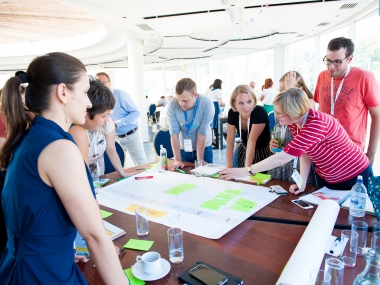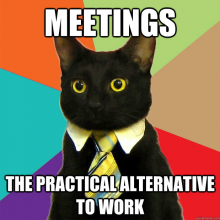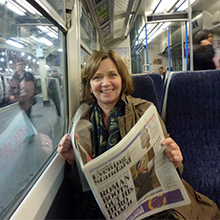Making Meetings Matter, City Centre Doctor explores the art of facilitation
Edited on
21 June 2019“If you had to identify, in one word, the reason why the human race has not achieved, and never will achieve, its full potential, that word would be 'meetings.” Dave Barry, humorist
How many meetings do you attend each week? And how often do you come out feeling inspired, motivated and ready to change the world?
Not so often? I thought so…..
Too many badly run meetings are a major barrier to productivity. According to a NESTA report ‘one recent study found that on average 15 per cent of an organisation’s collective time was spent in meetings, with senior executives spending two days a week in them with three or more co-workers. Another found 49 per cent of UK workers spend time in unproductive and inefficient meetings every week.’
There are number of solutions to this problem. One is to reduce the number of meetings we have. To ask- do we need this meeting at all? When urban innovators were asked at a recent Future Cities Catapult forum for the best ideas to disrupt industry models one participant simply said ‘ban meetings.’

The role of URBACT Coordinators
But given the reality that in urban planning we do still need to bring local stakeholders together frequently in order to coordinate, plan, and take decisions one of best options available to us is to improve the quality of meetings, by paying attention to the way in which they are facilitated. The URBACT programme places a strong emphasis on participative approaches, and promotes tools and methods that underpin interactivity, exchange and learning. URBACT local coordinators have two clear responsibilities in this regard. Firstly they are charged with running local meetings and events, bringing stakeholders together, leading the process of formulating an action plan. Secondly they are responsible for acting as a conduit for the transnational exchange, to make sure that the lessons learnt from other cities are shared and exploited at local level. So participation in an URBACT network and capacity building events, like the Summer University, gives partners an opportunity to experiment and upskill when it comes to facilitating local meetings and idea generation.
Facilitation of Local Groups
The City Centre Doctor project recently asked me to deliver training for network partners on facilitation. The aim was for Local Group Coordinators to gain a shared understanding of some of the key skills and tools of facilitation and idea generation and to feel more confident in planning and delivering activities to drive a participative process.
We started with some definitions of facilitation
- The process of making something easy or easier
- Helping a group to have efficient and inclusive meetings, to take decisions and action
- Drawing on existing knowledge, enabling insights
From the warm-up exercises we found out that there were varying levels of experience within the group. When asked what particular challenges they face in facilitation, the answers were probably common to most project leaders. They included
- how to make people feel valued and that their inputs are appreciated.
- how to encourage participation, also from participants who are shy or not used to speaking in a large group
- how to make sure we get things done
- opening our minds to new ways and tools to run meetings
- knowing which tool to use when
- how to practice and put theory into practice
Not surprisingly, there was a lively debate about ‘difficult people’ who come in all shapes and sizes. Participants talked about their experiences of critical voices, who are always pessimistic about any initiative or action and influence the atmosphere of a meeting. Many had experienced dominant people, who don't allow others to participate fully. One city representative wanted to know how she could avoid getting annoyed with a dominant character and reduce their input without being rude.
Hard and soft skills
 Analysing some of the key skills and roles of facilitators, (as codified by Seeds for Change), helped us to come up with solutions to these challenges. Listening carefully to interactions in a meeting and regularly stopping to clarify, summarise, and synthesise helps people to feel their voice is being heard, and also to keep the focus of the meeting sharp, moving towards decision-making. This means the facilitator has to communicate clearly, also in advance, about the objectives of the meeting, for instance circulating the agenda to all participants, and keeping to time and task. Vocalising and recording action points as the meeting progresses helps to build consensus, specify obstacles and get decisions made.
Analysing some of the key skills and roles of facilitators, (as codified by Seeds for Change), helped us to come up with solutions to these challenges. Listening carefully to interactions in a meeting and regularly stopping to clarify, summarise, and synthesise helps people to feel their voice is being heard, and also to keep the focus of the meeting sharp, moving towards decision-making. This means the facilitator has to communicate clearly, also in advance, about the objectives of the meeting, for instance circulating the agenda to all participants, and keeping to time and task. Vocalising and recording action points as the meeting progresses helps to build consensus, specify obstacles and get decisions made.
When a facilitator remains neutral, not taking sides in a debate, but being respectful of all participants it sets the tone for people to feel free to express themselves, to flush out the differences in a group in a constructive way. Good facilitators display a certain level of assertiveness, to be in control of the meeting, to challenge negative behaviour. Body language and tone of voice are important here, for instance using hand gestures and turning towards or drawing nearer to people to encourage them to speak, and away from those that have already spoken. With the persistently disruptive characters it can often be a good idea to have a one- to-one before or after meetings to understand the problem and also to reinforce the needs of the whole group to participate. Using tools like De Bono hats (to stimulate role play of different perspectives) can help participants that are stuck in a certain way of thinking to become more creative, and look at the situation from the viewpoint of others. Using small group discussions like buzz groups or OPERA can help those who are less confident in large groups to contribute their opinions.
During the training session we talked about the ways in which the facilitator can try to manage the ‘emotional climate’ of meetings, for instance by communicating with participants in advance, welcoming the group, and making sure the meeting space is comfortable and inviting. Keeping to time and task also helps to keep a positive environment. An example of bringing attention back to the meeting after the lunch break was provided by the City Centre Doctor Lead Partner as he talked the group through a short mindfulness exercise and gentle stretching.
Ultimately the most important success factor for good facilitation is planning and preparation. The time invested in shaping the agenda, thinking about which tools and methods to use, organising the space and equipment, briefing speakers and managing expectations pays dividends every time.
Multi-tasking and co-facilitation
It is clear that a facilitator is a multi- tasker. They are simultaneously a door keeper, speaker, input moderator, vibe watcher, timekeeper, note taker. It is almost impossible to do all of this well alone, so a team approach and co-facilitation can be the answer. The Local Coordinator can allocate different tasks to people in the room, including sometimes the ‘difficult’ ones.
Taking the lessons forward
When asked to reflect on their own skills one participant realised that, as an extrovert personality, he was very good at making people feel welcome, keeping the meetings lively. But he may need to pay more attention to listening skills. Active listening exercises can be useful, and a very simple to practice.
Another participant made the comment that, given our busy schedules, it's difficult to carve out time to prepare well for meetings. In future he said he will try to build that in more with colleagues.
In the hot debrief participants gave feedback that they valued the interaction in the group, sharing experiences and tips from their own realities. It had also been useful to identify the challenges and learning needs at the beginning of the session, and come back to them at various points in the training to document some of the solutions. There was a view that learning by doing is one of the best ways to become better facilitators, but also that there are lots of resources, films, toolkits (URBACT Local Support Group Toolkit) to help along the way. All City Centre Doctor partners undertook an exercise to prepare the next local group meeting that can now be put into practice. Many said they would also share these tips with the ULG and other projects, and try out the new methods.
Good facilitation can make meetings more enjoyable and productive. It can engage stakeholders, encourage participation and help local groups come up with more sustainable solutions to urban challenges. Developing facilitation skills can have a major impact on your personal and professional effectiveness, and on the quality of your relationships in teams and Local Groups. And the good news, as expressed by one training participant is “I realise that everyone can learn to facilitate and improve their skills’. The value of the participative approach that is supported by good facilitation has been recognised for a long time, as Confucius said in 450m BC “Tell me, and I will forget. Show me, and I may remember. Involve me, and I will understand.”
 Submitted by Sally Kneeshaw on
Submitted by Sally Kneeshaw on
